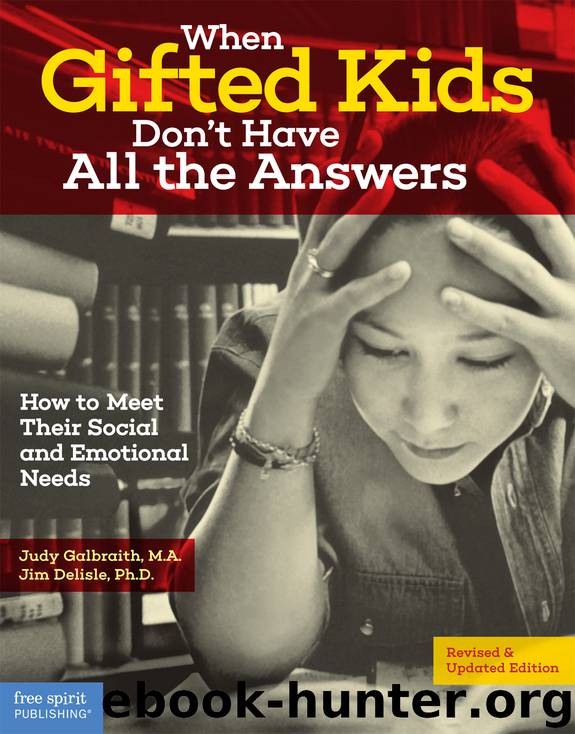When Gifted Kids Don't Have All the Answers by Jim Delisle Ph.D

Author:Jim Delisle, Ph.D.
Language: eng
Format: epub
ISBN: 9781631980145
Publisher: Free Spirit Publishing
Published: 2015-03-26T04:00:00+00:00
The list of “acceptable” occupations generally looks something like this:
doctor (a real doctor, not one of those Ph.D.-types)
scientist (a Ph.D. will do here, but only if it’s from a place like MIT or California Polytechnic or Cornell)
lawyer (anything but a public defender)
high-tech wizard (who starts a company and becomes a billionaire overnight)
professor (only if the previous options fall through—the pay is too low)
But what if you, as a gifted student, have ambitions to be an actor, not an architect? A teacher, not a techie? An advocate for the homeless rather than a Wall Street hedge fund manager? Where are the adults around you who should be saying, “I’ll support you all the way”? These rare individuals are the solace sought by many gifted adolescents trying hard to determine all that they want to be when they grow up. And as much as it might seem like a blessing to have so many more choices than others your age, it can actually grow to become an embarrassment of riches, where decisions are complicated by both internal and external factors that push against one another.
Multipotential and the decisions to be made about one’s far-off future are the basis of the following two activities. We encourage you to share these letters with your students, then just open up the floor for general discussion.
ACTIVITY What Are You Going to Do with the Rest of Your Life?
Give students a copy of “A Valedictorian Speaks Out at His High School Graduation.” Explain that it was written by an eighteen-year-old named John. After everyone has read the letter, open the floor to a general discussion. You might also ask your students to write letters of their own—as if they, too, were eighteen, just graduating, and looking ahead to their future.
Here are a few points you might want to raise and invite your students to comment on:
Many college freshmen change their majors before graduation. The only reason to declare a major in high school is to apply for scholarships directed at certain areas, such as the arts or sciences.
Some people are ready to announce at eighteen what they want to do and be when they’re forty. Others aren’t. Either way, the option to switch gears should always be left open.
John, the valedictorian, seems wise beyond his years. He realizes that not getting too serious about one’s economic future while still a teenager is a good way to approach life. Financial responsibility will follow soon enough.
On Becoming a Teacher
by R.G. McCune, 52
I was the only one in my family to graduate from college. My father was a mechanic and my mother stayed at home. When I was in high school, I belonged to the FTA—Future Teachers of America—during my senior year. I grew up in a small, rural county in West Virginia and there were no substitutes for absent teachers, so when someone was absent in the elementary schools, I was sent to substitute. I spent over sixty days of my senior year out in the schools and still managed to maintain all my own schoolwork.
Download
This site does not store any files on its server. We only index and link to content provided by other sites. Please contact the content providers to delete copyright contents if any and email us, we'll remove relevant links or contents immediately.
The Art of Coaching Workbook by Elena Aguilar(51199)
Trainspotting by Irvine Welsh(21667)
Twilight of the Idols With the Antichrist and Ecce Homo by Friedrich Nietzsche(18633)
Fangirl by Rainbow Rowell(9251)
Periodization Training for Sports by Tudor Bompa(8273)
Change Your Questions, Change Your Life by Marilee Adams(7783)
This Is How You Lose Her by Junot Diaz(6887)
Asking the Right Questions: A Guide to Critical Thinking by M. Neil Browne & Stuart M. Keeley(5775)
Grit by Angela Duckworth(5615)
Red Sparrow by Jason Matthews(5474)
Paper Towns by Green John(5191)
Room 212 by Kate Stewart(5123)
Ken Follett - World without end by Ken Follett(4734)
Housekeeping by Marilynne Robinson(4448)
The Sports Rules Book by Human Kinetics(4388)
Papillon (English) by Henri Charrière(4274)
Double Down (Diary of a Wimpy Kid Book 11) by Jeff Kinney(4272)
The Motorcycle Diaries by Ernesto Che Guevara(4102)
Exercise Technique Manual for Resistance Training by National Strength & Conditioning Association(4071)
